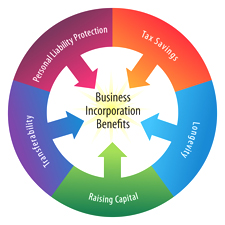Contents
Last updated: Jun. 12, 2013
 You have your business up and running, perhaps as a sole proprietorship or a partnership and are now seeing some growth and profit.
You have your business up and running, perhaps as a sole proprietorship or a partnership and are now seeing some growth and profit.
You may be wondering if you should now incorporate your business.
Advantages and Disadvantages of Various
Business Structures
The following is a list of possible advantages and disadvantages of the most common forms of business structure.
Sole Proprietorship
A sole proprietorship is a business owned by one person, called a “proprietor.”
Advantages
- Simplest and least expensive to set up
- Minimal registration requirements
- Owner in direct control
- Possible tax benefits (losses can be applied against other income of proprietor)
Disadvantages
- Owner assumes all risk of business; responsible for payment of all business debts. Creditors can seize your personal assets.
- Lack of continuity (ownership not transferable)
- Difficult to raise capital
- Possible tax disadvantages (profits must be added to personal income)
Partnership
Business owned by two or more individuals or corporations.
Advantages
- Easy to set up and very flexible
- Limited regulation
- Partners provide sources of additional capital and skills
Disadvantages
- Partners assume personal liability for debts of business
- If disagreements arise, business can suffer
- More complex record keeping and tax returns
Corporation
A separate legal entity which can enter into contracts and own property separately and distinctly from its owners who are the shareholders.
Advantages
- Limited liability (generally limited to individual’s personal investment in the business)
- Continuous existence (ownership transferable)
- Easier to raise capital (i.e. money for the business can be raised by selling shares)
- Possible tax advantages
Disadvantages
- More expensive and complicated to set up and maintain
- Extensive record keeping and complex taxation
- Closely regulated
Still not sure which business structure is right for you?
All FBC Members receive free business consultation as part of membership.
